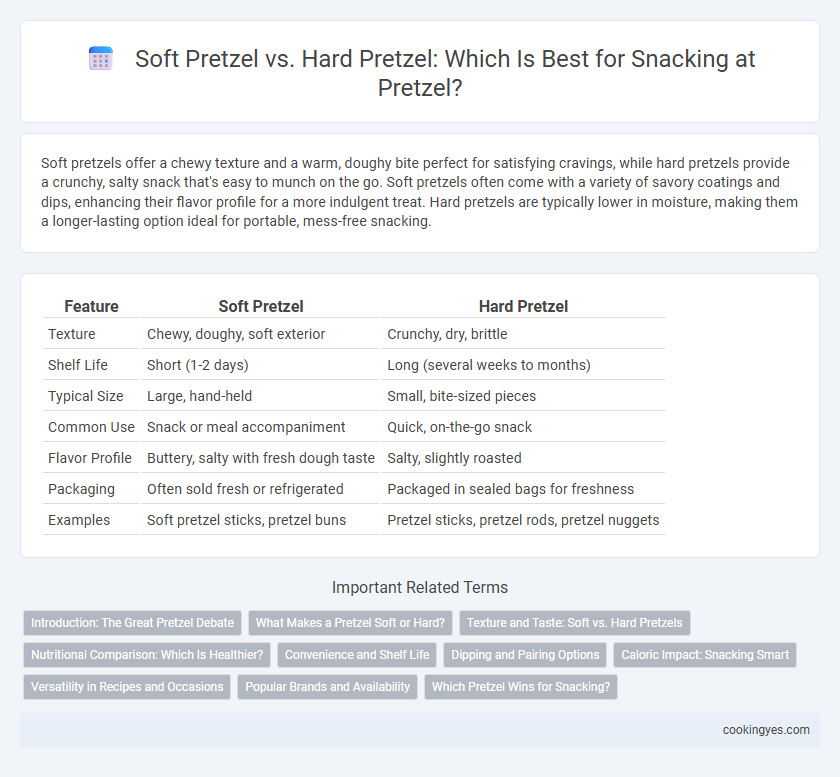Soft pretzels offer a chewy texture and a warm, doughy bite perfect for satisfying cravings, while hard pretzels provide a crunchy, salty snack that's easy to munch on the go. Soft pretzels often come with a variety of savory coatings and dips, enhancing their flavor profile for a more indulgent treat. Hard pretzels are typically lower in moisture, making them a longer-lasting option ideal for portable, mess-free snacking.
Table of Comparison
| Feature | Soft Pretzel | Hard Pretzel |
|---|---|---|
| Texture | Chewy, doughy, soft exterior | Crunchy, dry, brittle |
| Shelf Life | Short (1-2 days) | Long (several weeks to months) |
| Typical Size | Large, hand-held | Small, bite-sized pieces |
| Common Use | Snack or meal accompaniment | Quick, on-the-go snack |
| Flavor Profile | Buttery, salty with fresh dough taste | Salty, slightly roasted |
| Packaging | Often sold fresh or refrigerated | Packaged in sealed bags for freshness |
| Examples | Soft pretzel sticks, pretzel buns | Pretzel sticks, pretzel rods, pretzel nuggets |
Introduction: The Great Pretzel Debate
Soft pretzels offer a chewy texture and warm, doughy flavor ideal for dipping and sharing, while hard pretzels provide a crunchy, salty bite perfect for on-the-go snacking and longer shelf life. Nutritionally, soft pretzels tend to contain more moisture and calories, whereas hard pretzels are lower in fat and often baked to a crisp finish. Preference between soft and hard pretzels depends on texture and taste priorities, with both varieties popular worldwide.
What Makes a Pretzel Soft or Hard?
The key factor that determines whether a pretzel is soft or hard lies in its baking process and moisture content. Soft pretzels are baked at a higher temperature and have a thicker dough, which retains more moisture, resulting in a chewy and tender texture. Hard pretzels are baked longer at lower temperatures, allowing more moisture to evaporate, creating a crisp and crunchy snack ideal for dipping or extended shelf life.
Texture and Taste: Soft vs. Hard Pretzels
Soft pretzels offer a chewy, doughy texture with a slightly sweet and buttery flavor that enhances their snack appeal. Hard pretzels provide a crunchy, dense bite paired with a saltier, more toasted taste, ideal for longer-lasting snacking. Texture contrast is the primary distinction: soft pretzels are moist and pliable, while hard pretzels are crisp and brittle.
Nutritional Comparison: Which Is Healthier?
Soft pretzels contain more moisture and calories due to their doughy texture, often leading to higher sodium and carbohydrate content compared to hard pretzels. Hard pretzels typically offer lower fat and calorie counts, making them a better option for calorie-conscious snacking. Both options are high in refined carbohydrates, but portion control and seasoning play critical roles in determining their overall health impact.
Convenience and Shelf Life
Soft pretzels offer immediate convenience with their chewy texture and are best enjoyed fresh due to their shorter shelf life, typically lasting only a day or two without refrigeration. Hard pretzels excel in long-term storage, maintaining crispness for several weeks or even months when kept in airtight packaging, making them ideal for on-the-go snacking. The choice between soft and hard pretzels depends on the balance between ready-to-eat freshness and extended shelf stability for convenience.
Dipping and Pairing Options
Soft pretzels offer a warm, chewy texture that pairs perfectly with creamy dips such as cheese sauce, mustard, and ranch, enhancing the snacking experience with rich flavors. Hard pretzels provide a crunchy bite ideal for robust dips like hummus, guacamole, or thick salsas, making them a versatile choice for various flavor profiles. Both pretzel types complement beverages like beer and soda, but soft pretzels often accommodate sweeter dips such as cinnamon sugar or chocolate for diverse pairing options.
Caloric Impact: Snacking Smart
Soft pretzels typically contain around 300-400 calories per serving due to their larger size and moisture content, making them a more filling snack option. Hard pretzels generally have fewer calories, approximately 110-120 per ounce, offering a lighter alternative for calorie-conscious snacking. Choosing between the two depends on balancing portion control and desired satiety while managing overall caloric intake.
Versatility in Recipes and Occasions
Soft pretzels offer exceptional versatility for snacking due to their chewy texture and ability to be paired with a wide range of dips, cheeses, and toppings, making them ideal for casual gatherings and savory recipes. Hard pretzels provide a crunchy, long-lasting snack perfect for on-the-go consumption, with their firm texture complementing spicy seasonings or sweet coatings, suitable for parties and trail mixes. Both varieties adapt well to diverse culinary applications, from dips and spreads to being crushed as crusts or toppings, catering to different palate preferences and occasions.
Popular Brands and Availability
Soft pretzels, commonly favored for their chewy texture, are widely available from brands like Auntie Anne's and Wetzel's Pretzels, often sold fresh at malls and sporting events. Hard pretzels, known for their crunchiness and longer shelf life, dominate the packaged snack aisle with well-established brands such as Snyder's of Hanover and Rold Gold. These popular brands ensure easy accessibility of both pretzel types across grocery stores, convenience shops, and online retailers, catering to diverse snacking preferences.
Which Pretzel Wins for Snacking?
Soft pretzels offer a chewy texture and warm, savory flavor that appeals to those seeking a hearty snack, often enjoyed fresh with mustard or cheese dips. Hard pretzels provide a crunchy bite and longer shelf life, making them a convenient, portable choice for on-the-go snacking and pairing with cheeses or spreads. For snacking versatility, hard pretzels win due to their durability and ease of portion control, while soft pretzels excel in flavor and indulgence.
Soft pretzel vs hard pretzel for snacking Infographic

 cookingyes.com
cookingyes.com